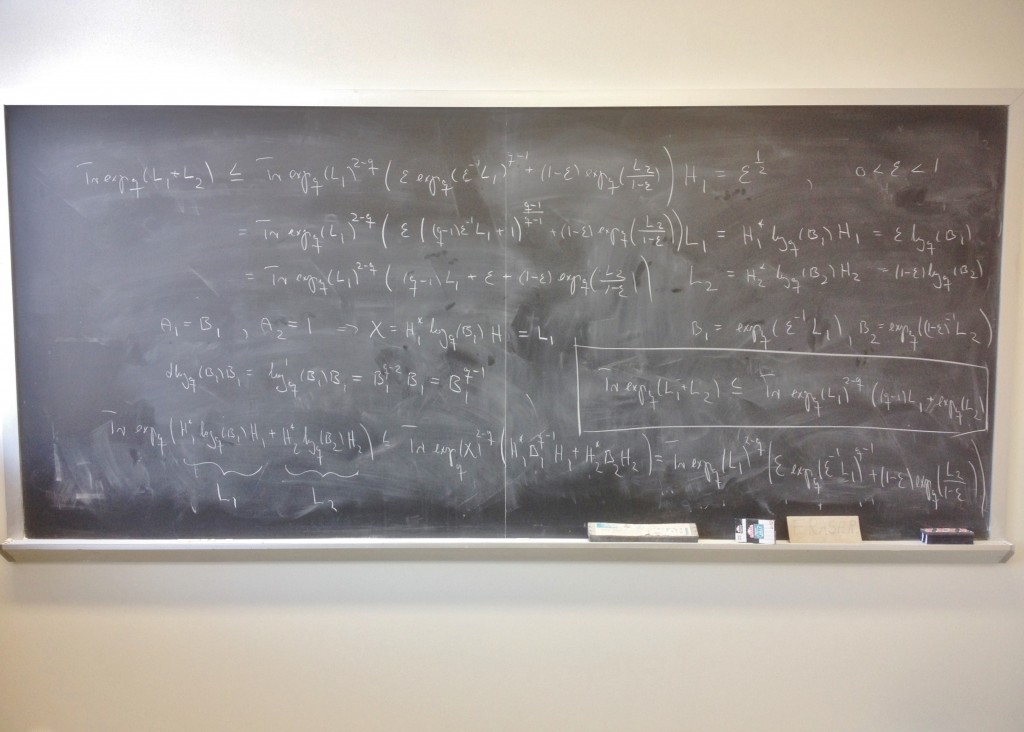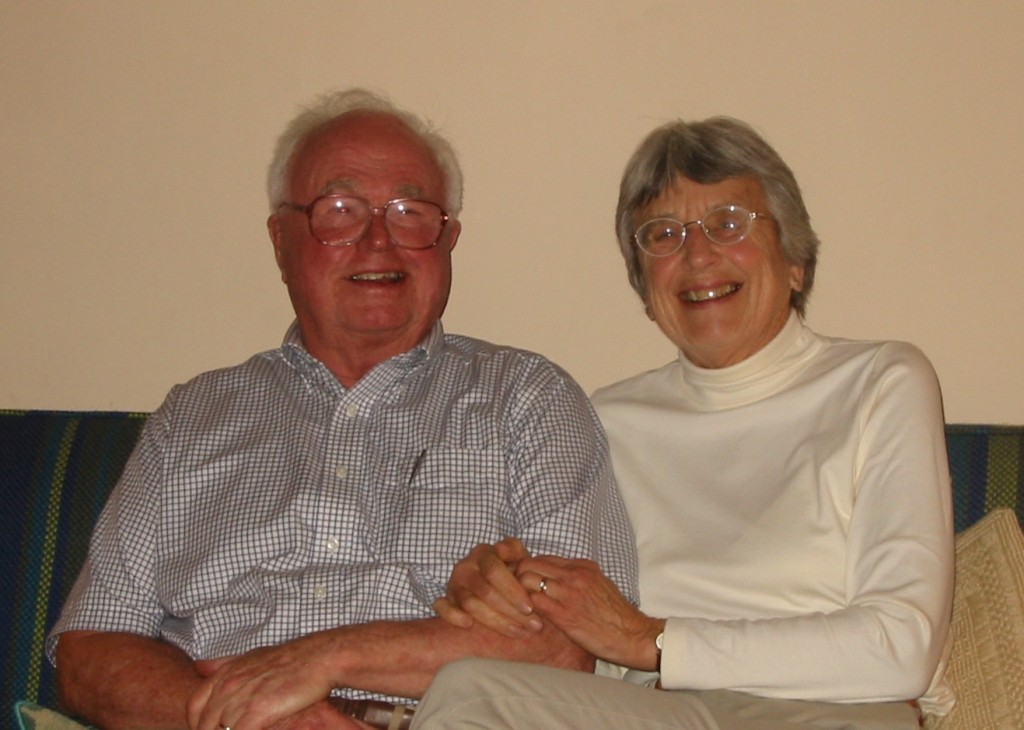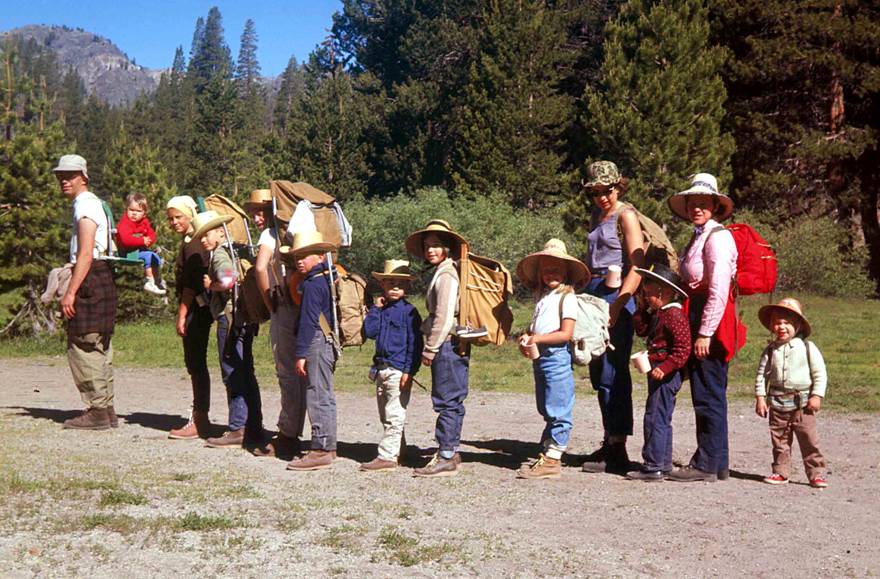Not long ago, my brother Alan and I went to my father’s office at UCLA to decide if a Danish sofa that had been there since 1970 was worth saving and to see how much stuff still needed to be cleared out. After 60 years UCLA finally wanted the office back and Dad, who has late-stage Parkinson’s disease, isn’t using it any more. The office was pretty empty. UCLA Archives had hung notes on a shelf and a drawer saying their review was complete. Whatever remained could be tossed. The bottom shelf of one bookcase was packed with decaying binders of Dad’s lecture notes and class material. Other shelves held stacks of manuscript reprints and folders full of mathematical musings. My father’s distinctive writing – confident, slightly slanted script and equations written in bold, black fountain pen – was evident everywhere.
I made a small stack of Dad’s work to bring home. Starting with his dissertation, each piece a mystery.
1. “Representations of AW* Algebras.” 1955, his Ph.D. dissertation at Yale.
2. “Order and Commutativity in Banach Algebras,” 1958.
3. “Algorithms for Determination of the Polynomial of Best Minimax Approximation to a Function Defined on a Finite Point Set.*” 1959.
4. “n-Parameter Families and Best Approximation,” 1959.
5. “The Wedderburn Decomposition of Commutative Banach Algebras,” 1960.
6. “Derivations of Commutative Banach Algebras,” 1961.
7. “Convergence of Approximating Polynomials,” 1962.
8. “Divergence of Approximating Polynomials,”1963.
9. “The Degrees of Approximation by Positive Convolution Operators,”1965.
10. “Embedding Theorems for Commutative Banach Algebras,” 1966.
11. “Automatic Continuity in Algebras of Differentiable Functions,” 1976.
12. “Divisible Subspace and Problems of Automatic Continuity,” 1980.
13. “Radical Banach Algebras and Automatic Continuity,”1981.
14. “Amenability and Weak Amenability for Beurling and Lipschitz Algebras,” 1986.
15. “Amenability, Weak Amenability and the Close Homomorphism Property for Commutative Banach Algebras.”
16. “Raising Bounded Groups and Splitting of Radical Extensions of Commutative Banach Algebras,” 2000.
There were many more. I finally found one I thought I could understand:
17. “Math through the Ages: A Gentle History for Teachers and Others. A book review.” By PCC Jr., American Mathematical Society, 2004.
Many of the papers began with words I’d heard my father utter a hundred times. Words whose cadence was familiar and comforting and whose meaning unfathomable, like the Italian operas that lulled us to sleep every night from his high-fidelity, reel-to-reel, stereophonic tapes.
“Let f(X) be…”
“Given a function f(X) defined on a finite point…”
“Let X be a compact set in the complex plane C…”
“Let f be continuous and periodic on the interval…”
Alan and I sat in Dad’s office – me in the desk chair, Alan sunk into the broken springs of the old Danish sofa – and talked about what this all meant, about who Dad was. What is the brain like of someone who spends his life at this level of abstraction, thinking about things maybe a handful of other people on earth understand, communicating in a technical, precise language known only to those who devote years to deciphering its symbols and syntax?
I can imagine what is happening inside the mind of a writer hunched over a computer. I understand the mental effort required to construct a particularly clear or poetic or descriptive or evocative sentence. What does it feel like to think thoughts like this?
“Assuming U ≠C(Ω) the proof proceeds by defining Y=L^2 (dμ1) where μ ϵ (Ω)and μ⊥u,μ ≠0. If X=L^(2 ) closure of u in Y, then the homological algebra consequences of amenability yield that there exists a projection of P of Y onto X satisfying P(fy) = f P(y), f ϵ U,y∈Y).”*
When we returned home, my uncle, Myron, told the story of why he’d given up mathematics and switched to computing. In the early 1960’s Myron took a graduate math class at UCLA. My father (his brother) was the instructor. Dad had assigned a particularly difficult problem. Weeks went by and no one in the class could solve it. One day Myron decided to take it on. He did nothing else for an entire week. Myron thought about the problem while he was awake, asleep, during meals, while caring for his kids, driving to work, playing squash, all the time. By the end of the week he had an epiphany and solved it. The moment he turned in the completed problem to my father, Myron said, he knew he’d had enough. He was exhausted. He did not want to spend his life at that level of intense contemplation, solving problems of pure, glittering abstraction.
That is what my father spent his life doing.
And yet Dad was so normal. He wasn’t good at small talk or asking you about your feelings, but he was sociable, friendly, a facilitator and an organizer. Dad created adventures, had intense interests and didn’t allow minor things like one professor’s salary and five kids limit his ability to travel or experience the finer things in life. He made economy into a virtue and having high-end experiences on a dime into an intellectual challenge. For Dad, ingenuity mattered a lot. He admired smart adventurers and explorers. He appreciated fine music, food and wine. He loved to travel, to hike and to ski. He loves my mother. He is still tenacious. He now spends a lot of time in his own mind riding through the memories and thoughts of a fantastic life.
*For any mathematicians reading this, sorry for the mistakes. It’s the first time I’ve ever ventured into the “insert equation” function of Word and, frankly, I’m not sure what some of the symbols are.





Well done, Anne! As an undergrad Math major, I’m not sure I understood anymore than you did! But the big question remained unanswered… What about the Danish Sofa?
Beautiful, Anne. I never tire of reading your thoughts. This dedication to your father is beautiful. And, as John Powell said, what about the sofa? Lol.
As usual, you are spot on with your writing. Your dad has math, you have writing. And yes, as john Powell asks, what about the sofa?
Beautiful, Anne.
The Danish sofa was deemed salvageable. It now resides in my parent’s garage waiting for me to do something with it.
I was trying to figure out if the expression “The Sum of the Parts is Greater than the Whole” is fitting for your father or whether it is better said in reverse, but I decided that for some people like your father, the sum is incalculable. Thanks for sharing.
Eloquent tribute to your father, who appears to be a true Renaissance man!
Just simply lovely. Amazing to reflect on a parent as more than just your parent! Thanks!
It obviously was a rich experience to empty your dad’s office. I have enjoyed immensely reading your description and reactions. I have a small stake in the life that you touched on here, and also a big stake in what such a life might be, insofar as I’ve had one that in many ways was similar. That is another story, but for now I want to say that few mathematicians have meant as much to me as your dad. None has enriched this life of mine in so many ways as he has: mathematically, and also in other respects that your post alludes to: nature, wine, opera. He has lead a truly rich life, and we can be glad and thankful that some of it has rubbed off on us.
Just one more comment to what Anne mentions:
It is true that mathematical text can look awesome. But don’t forget that we are basically dealing with a language. Some of the words are English (or whatever), but in a way math is no more mysterious than any other language. We may or may not be familiar with it: Finnish texts are not necessarily ‘deeper’ than English ones, nor only comprehensible to very special minds. But if you don’t know Finnish, it sure looks forbidding. That said, mathematical texts are packed with information and they tend to represent condensed thoughts, so they may well be difficult even if you know the ‘language’.
Dear Anne! Thank you so much for sharing your thoughts about your father’s life with us. I have read it with tears in my eyes, thinking also of the many memories I have of him and your mother. I feel very sad that he is as ill as he is, but grateful that he had so many good years. I cherich my own memories of him both here and in Maine. – I have loved reading all your stories from Africa.
Love Kirsten
Oh Anne , that was beautiful. I have had a similar epiphany with our dad, going through his papers the last several years before his death and after. He, like your dad ‘was in his head’. But a more kind, accepting , understanding, loving man you could not find and he loved our mother. It is good you have gotten to know’ the man’ before he is gone. I sure love you dear sister (in-law) and appreciate your kind heart.
Anne – Thanks for sharing about Phil. I have been thinking about him as I’ve gotten into listening to opera lately, yet haven’t seen one. Thinking about math reminds me of thinking about music – neither is something that my brain readily does, and only up to a certain point. I am amazed by people who can do this. Reading the list of Phil’s publications was “greek” to me, like when I hear the symphony conductor discuss the nuances in the music, using terms that are also “greek” to me. It hard for me to fathom how you get your brain to do this. The photos are priceless, reminding me of the many great times that I spent with your family. Karen-Kai